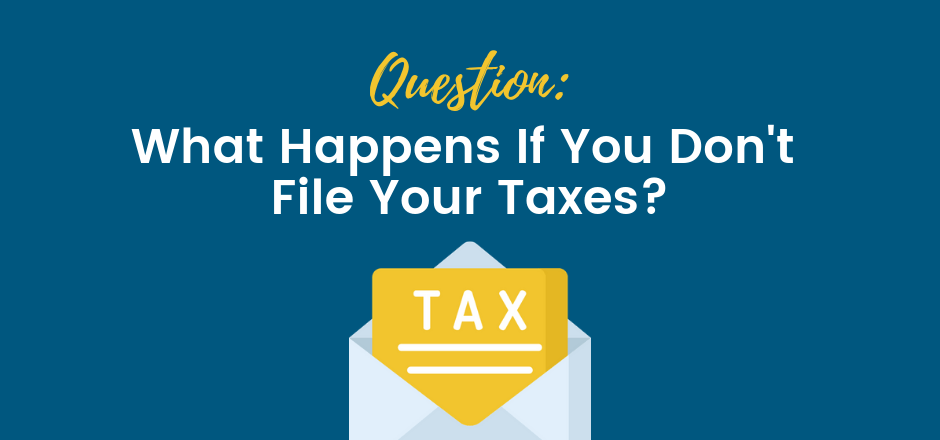What Happens if You Don’t File Your Taxes?
If you’re thinking about not filing your taxes this year, you might want to consider the penalties before it’s too late.
Here’s what happens if you don’t file your taxes.

What Happens if You Don’t File Your Taxes?
We all hit rough patches from time to time, putting us behind on our bills or even our taxes.
While the thought of dealing with the Internal Revenue Service (IRS) is very scary to some people, they are far more willing to work with people who need help than most realize. The one thing you don’t want to do is simply skip filing your tax return.
The penalties and consequences for doing this are far more difficult to handle than simply paying late or making repayment arrangements.
Today, we’re taking a closer look at what happens if you don’t file your taxes so you know what to expect.
If you have skipped filing your taxes in the past and need help navigating the complex and technical aspects of tax law, give us a call and we’ll help you find a tax lawyer who can help you resolve the matter.
Related: What does a Tax Attorney Do?
Not Filing vs Fraud
It’s important to start by pointing out the distinction between failing to file your tax return and committing outright fraud. Fraud is a conscious and willing effort to misrepresent your numbers in order to minimize the taxes you owe to your state or the IRS. These two actions, while similarly negative, are not the same.
The most common examples of fraud involve underreporting your income, attempting to fake your numbers by using the wrong amounts and taking deductions you don’t actually qualify for.
Other forms of tax fraud include, but are not limited to:
- Using a fake social security number (SSN)
- Claiming a dependent you do not actually support
- Purposely destroying your records to hide attempts at evasion
- Faking charitable donations
- Lying to the IRS under oath
Simply not filing your tax returns is considered avoidance, but is not necessarily considered fraud. Some people are simply lazy and don’t file, or forget to file, while others have varying reasons for missing the deadline.
Some of the most commonly used excuses for not filing include:
- The taxpayer is deceased and the estate is late
- The taxpayer has experienced the loss of an immediate family member
- Confusion about how to file, especially among independent contractors
- Receiving bad advice from someone who is supposed to be a tax professional
- A misguided belief that income taxes are not required or Constitutional
- Records destroyed in a catastrophic event (like a house fire)
- Active duty status in the military
- Incarceration or imprisonment
Some of these reasons are perfectly reasonable. The IRS is incredibly flexible when it comes to working with people who have experienced a loss, settling estates, military status, and catastrophic events. In many cases, they will even waive late fees and penalties.
The IRS is not as forgiving towards those who simply claim ignorance to the law. It is your responsibility to find help if you aren’t sure how to file your taxes. The only exception is if you are making regular attempts to contact the IRS itself and they are not making themselves available to help you. This type of situation will require careful documentation of consistent and regular efforts.
Penalties for Unpaid Taxes
The penalties and fines associated with unpaid taxes are high and can add up quickly if you don’t address your issues.
Those who don’t file by the deadline will be charged a five percent failure-to-file penalty based on the amount owed. That amount can increase to up to 25 percent of your balance owed over time. If you wait more than sixty days to file will be charged a fee totaling the lesser of the tax balance or a flat $135. You will also be charged late fees.
Interest is another problem for those who don’t file. Not filing and paying a failure-to-file penalty doesn’t mean you don’t owe the money, so the IRS will still calculate late fees and interest, dating back to April 15th of the year you were supposed to file. Late fees are usually equivalent to 0.5 percent of your monthly total bill; the compounding interest rate is a staggering three percent for each day you are late.
The only way to avoid late fees and interest is to figure out what you owe and pay at least 90 percent. This is true whether you’ve filed the actual return or not.
Don’t owe anything at all? Are you owed a refund? You won’t have to pay any sort of failure-to-file, late fee, or interest. You just won’t refund, and the IRS will eventually come looking for you to figure out where your returns are.
Will You Go to Jail?
Avoiding your taxes by simply not filing your return is not generally considered a criminal offense.
There are no debtors prisons in the United States. Most people do not go to jail for simply not filing their tax returns. There is some grey area, though, especially if you consciously decide not to file because you know you owe a lot of money. The IRS may (depending on your situation) decide you are acting in a criminally evasive manner instead.
The punishments for criminal actions and fraud usually include jail terms of at least five years, in addition to fines and penalties.
How to Correct the Situation
The first thing you want to do is be proactive.
If you the tax deadline, it’s better to contact the IRS before they realize you haven’t filed. You may formally file for an extension by filing form 4868 before April 15th (or the current year’s tax deadline). This will give you until October 15th to file your taxes.
You will still have to pay late fees and interest, but the failure-to-file penalty will be waived.
What Happens if you don’t File Your Taxes in California?
State taxes are treated in a similar manner.
Most states will offer anyone who requests it a six-month extension. Otherwise, you will be subject to penalties and fees similar to those charged by the federal government. You are encouraged to file sooner rather than later to minimize your liabilities.
Conclusion
So, there you have it.
Now you know what happens if you don’t file your taxes. Whether you’re experiencing financial hardship or missed the deadline to file, a tax attorney will be able to guide you through the process of resolving any issues.
Not filing your taxes can quickly snowball into a very uncomfortable and expensive situation. Talk to a qualified tax attorney if you fear you are in trouble with the IRS, or if you have gotten to the point where collection attempts have become aggressive and more serious in nature.
An attorney can communicate with the IRS on your behalf and help you resolve your problems.
Not sure where to start?
Tell us a little about your situation and we’ll help you find a tax attorney familiar with the complex and technical aspects of tax law.
Are you in search for a certified attorney to represent you?
Let us help you find one today!


